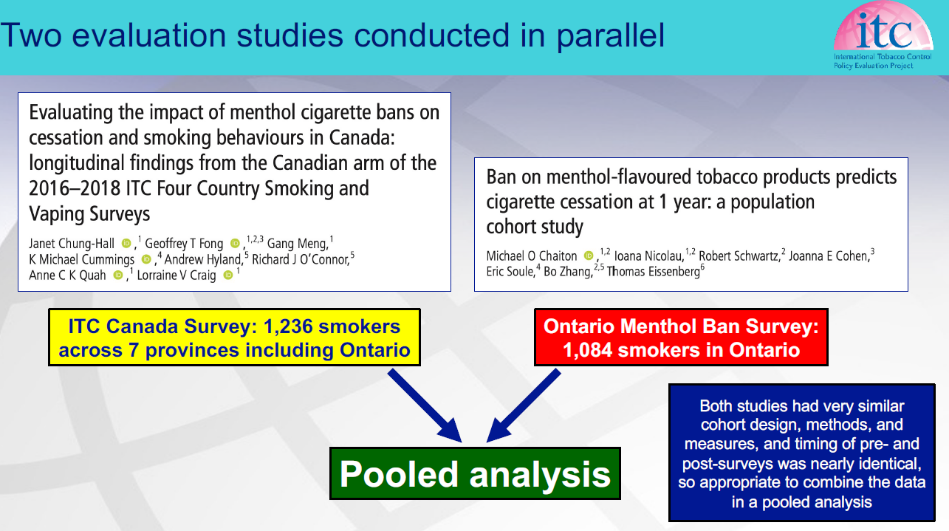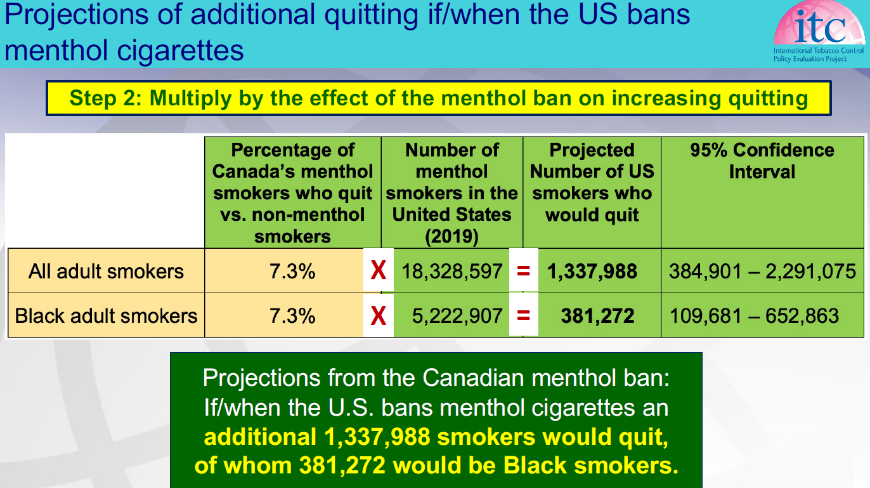Guest Authors: Geoffrey T. Fong, Janet Chung-Hall, and Lorraine V. Craig, ITC Project, University of Waterloo
Michael O. Chaiton, Center for Addiction and Mental Health, and Ontario Tobacco Research Unit
On April 28, 2022, the US FDA announced its long-awaited proposed rule to ban menthol in cigarettes, with a parallel proposed rule to ban menthol in cigars. The same day, Tobacco Control journal published a study led by the International Tobacco Control Policy Evaluation Project (ITC Project) (Fong et al.)[i], providing real-world evidence from Canada showing that menthol bans led menthol and non-menthol smokers to quit, and projecting that a US menthol ban could lead more than 1.3 million US smokers to quit, including more than 381,000 African American smokers.
The new study combined data from the ITC Project (Chung-Hall et al.)[ii] and the Ontario Menthol Ban Study (Chaiton et al.)[iii] to produce more robust estimates of the impact of Canada’s menthol ban on quitting among smokers.
Canada was one of the first countries in the world to ban menthol cigarettes. The province of Nova Scotia was the first jurisdiction to ban menthols in May 2015. Six other provinces banned menthols before Health Canada imposed a national ban covering the three remaining provinces in October 2017.
Two cohort studies have evaluated the menthol ban in Canada. The ITC Project’s ongoing national cohort survey in Canada was ideally positioned to evaluate the impact of the ban, with a pre-ban wave in 2016 and a post-ban wave in 2018.
Between the two waves, 7 provinces banned menthol cigarettes, and thus the ITC evaluation measured the impact of the menthol ban in these provinces covering 83% of the Canadian population. Included in the ITC evaluation were 1,236 smokers (138 menthol and 1098 non-menthol) who responded at both survey waves.
The second cohort study was the Ontario Menthol Ban Study, which was conducted only in Ontario, with 1,084 smokers (295 menthol and 789 non-menthol).

The two studies employed a cohort design, used similar definitions of menthol smoking status and post-ban quitting, and were conducted within 1-2 months of each other at pre-ban (2016) and post-ban (2018), and thus it was reasonable to pool them together to produce more precise estimates of the impact of the menthol ban.
The pooled analysis found that post-menthol ban quit rates were significantly higher among menthol smokers (22.3%) compared to non-menthol smokers (15.0%). The effect size was 7.3 percentage points (95% CI: 2.1% to 12.5%, p=0.006).
What are the implications of the evaluation of the Canadian menthol ban for the United States when it implements its own menthol ban?
We produced projections of impact of a US menthol ban on increased quitting by first obtaining the number of menthol smokers in the US from the National Survey on Drug Use and Health (NSDUH) for 2019. We computed the number of menthol smokers overall, and then the number of menthol smokers among African American smokers, since menthol share is so much higher among African American smokers (about 85%) than among non-African American smokers (about 30%).
We then multiplied the effect size of additional quitting among menthol smokers in Canada of 7.3% by the number of menthol smokers to obtain projections of the number of smokers who would be expected to quit after a US menthol ban.
The numbers are quite astonishing. We estimate that, if the US menthol ban would have the same impact on increasing quitting that was found after the Canadian menthol ban, this would lead to an additional 1,337,988 smokers who would quit, of whom 381,272 would be African American smokers.

For decades, the African American community has been disproportionately devastated by menthol cigarettes. But that means that they will have the most to gain from a menthol ban. The proposed rule to ban menthol in cigarettes and in cigars will be a landmark achievement for public health in general and for advancing the fight to address health inequity. Our findings point to the enormous potential of the proposed menthol ban to increase quitting among smokers.
We are in the process of conducting additional analyses on the impact of Canada’s menthol ban on illicit product purchasing and to examine the longer-term impact of the menthol ban on quitting.
For further information, contact Professor Geoffrey T. Fong, Founder and Chief Principal Investigator of the ITC Project, Professor of Psychology and Public Health Sciences, University of Waterloo, gfong@uwaterloo.ca. See the ITC Project website at www.itcproject.org.
[i]Fong GT, Chung-Hall J, Meng G, et al. Impact of Canada’s menthol cigarette ban on quitting among menthol smokers: pooled analysis of pre–post evaluation from the ITC Project and the Ontario Menthol Ban Study and projections of impact in the USA. Tob Control. Published Online First:
28 April 2022. doi:10.1136/tobaccocontrol-2021-057227. Link
[ii]Chung-Hall J, Fong GT, Meng G. et al. Evaluating the impact of menthol cigarette bans on cessation and smoking behaviors in Canada: longitudinal findings from the Canadian arm of the 2016-18 ITC Four Country Smoking and Vaping Surveys. Tob Control. Published Online First: 05 April 2021.
doi: 10.1136/tobaccocontrol-2020-056259. Link
[iii]Chaiton MO, Nicolau I, Schwartz R, et al. Ban on menthol-flavoured tobacco products predicts cigarette cessation at 1 year: a population cohort study. Tob Control. 2020;29:341-347. Link



